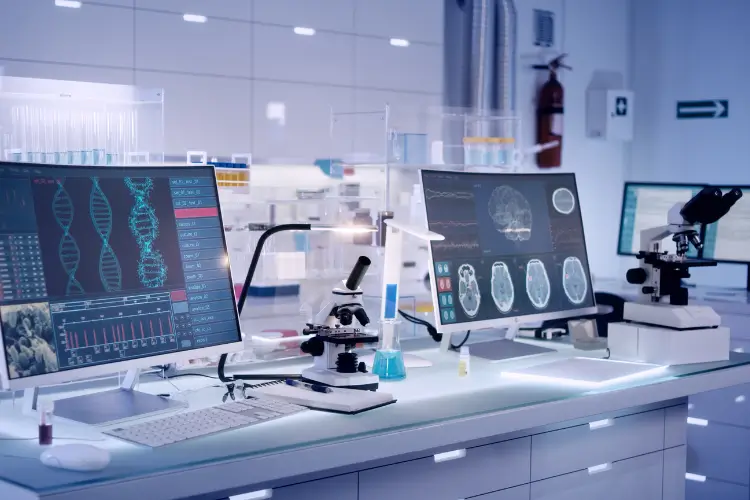In the field of science, the advancements in lab equipment are pivotal for groundbreaking research and experiments. The year 2024 has introduced a variety of innovative tools and technologies that have significantly enhanced the functionality and efficiency of labs around the globe. Among these developments, certain standout innovations have redefined what is possible in scientific investigation, making complex analyses simpler and more reliable.
These innovations in laboratory equipment have brought about transformative changes across numerous scientific disciplines. Whether it’s for chemical analysis, biological research, or material testing, the latest technologies offer unprecedented precision and ease. Focusing on improving various aspects of laboratory operations, the advancements in 2024 are tailored to meet the diverse needs of researchers and technicians alike.
Automation and Robotics
Integrating automation and robotics in lab and research equipment has been a game-changer. Automated systems can handle repetitive tasks with remarkable accuracy and consistency, freeing time for researchers to focus on more complex aspects of their work. From automated pipetting systems to robotic arms that manage sample preparation and analysis, these technologies reduce human error and enhance the reproducibility of outcomes. Such systems are especially beneficial in high-throughput environments where the volume of samples exceeds manual handling capacities.
However, as laboratories continue to adopt advanced technologies, it’s not just physical automation that plays a critical role—data management has also become essential to ensuring smooth operations. This is where understanding the answer to questions like ‘what is a laboratory information system?’ is highly valuable. A Laboratory Information System (LIS) is a software platform designed to manage the flow of information within a lab, helping track samples, manage test results, monitor inventory, and maintain compliance with regulatory standards. By integrating an LIS alongside robotic and automated systems, labs can achieve end-to-end efficiency—from sample collection and preparation to data reporting and archival.
These systems not only streamline daily workflows but also offer real-time visibility into lab operations, enabling faster decision-making and higher levels of data accuracy. As a result, modern labs are becoming more connected, scalable, and capable of delivering reliable, timely results in increasingly complex research environments.
Enhanced Spectroscopy Instruments
Spectroscopy, a crucial technique used in many laboratories, will be significantly enhanced in 2024. New models of spectrometers are equipped with advanced sensors that provide greater sensitivity and faster data collection rates. These instruments can detect even the smallest spectral differences, which is essential for the accurate identification and quantification of substances. Moreover, the latest spectroscopy equipment comes with integrated software solutions that simplify data analysis and visualisation, allowing for more intuitive interpretation of results.
Portable and Miniaturised Devices
The trend towards miniaturisation continues to prevail in the design of laboratory equipment. Portable devices have become increasingly popular, offering the ability to perform tests and analyses directly in the field. These compact units are easy to transport and provide immediate results, which is crucial in time-sensitive research areas such as environmental monitoring and on-site medical diagnostics. Furthermore, miniaturised devices often consume less power and require fewer reagents, making them a cost-effective option for many laboratories.
Field-deployable air monitoring often relies on impaction samplers paired with appropriate culture media to characterise airborne bacterial loads. For many teams conducting environmental surveillance, using validated culture substrates ensures consistent recovery; for example, sterile, gamma-irradiated TSA Air Sampling Plates are commonly used with 85mm impaction samplers to monitor bacterial contamination. These pre-packaged plates reduce handling-related contamination and come with quality and growth-promotion certificates that support comparability across sampling campaigns. Incorporating standardised consumables into portable workflows strengthens data reliability and speeds on-site decision making.
Green Laboratory Technologies
Sustainability has become a key concern in lab and research equipment design and operation. In response, 2024 has introduced more energy-efficient and eco-friendly technologies. Innovations include solvent-free chemical analysers and biodegradable consumables that minimise environmental impact. Additionally, many instruments now feature enhanced recycling capabilities from recycled materials, supporting the global push towards greener research practices.
Advanced Imaging Systems
Imaging technologies have undergone profound transformations, with new systems offering higher resolutions and faster processing times. These advancements are particularly significant in fields like microbiology and material science, where detailed visual analysis is critical. Modern imaging equipment utilises powerful algorithms to enhance image clarity and detail, facilitating a deeper understanding of the structures and dynamics under study. This improves the accuracy of experimental data and expedites the research process.
The year 2024 marks a milestone in the evolution of laboratory equipment, with each innovation offering a new dimension of capability and efficiency. These advancements reflect a growing synergy between technology and scientific inquiry, opening new avenues for discovery and understanding. The impact of these developments is profound, enabling scientists to reach new levels of precision and efficiency in their research endeavours. As the landscape of scientific investigation continues to evolve, one can expect laboratory tools to play an increasingly critical role in shaping the future of research and technology.
Written By: Victoria Barnes



